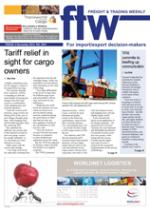In an environment where
working smarter to cut costs
is the universal mantra,
increasingly sophisticated
information technology is
making the difference.
“The demands of the
international supply chain
are forcing importers,
manufacturers and retailers to
take a closer look at managing
the supply chain better by
optimising the cost of their
raw materials and imported
goods. Internationally the
trend is to look more and more
at how the ocean freight side
of things can become more
predictable,” says Unitrans
MD Paul Stephen.
“One of the big frustrations
we face is the lack of real-time
milestone management,”
says Stephen.
“At the end of the day an
importer in South Africa
doesn’t really want to know
when a container was
transhipped in Singapore. He
wants to use that information
to try to predict when he’s
going to get it.”
While historical tracking
is available on shipping lines’
websites that will tell you
where the container was last
loaded and discharged – it’s
not predicting when its going
to arrive.
“We as the freight
forwarding industry need to
put that information together
and tell the customer when he
will get his container.”
And that’s what Unitrans is
working towards.
The company will shortly
be implementing a new
status report system based on
milestone reporting.
“We will effectively identify
what milestones are important
to the customer and at the time
of taking a booking we will
set up the milestones and track
against those.”
In Stephen’s view, freight
forwarding needs to become
an information business. “We
need to help the SA importer
and exporter to manage his
supply chain better. There’s
not enough recognition of
how much money is tied up in
inventory that’s on the water.”
For Stephen, information
technology has been an
integral element of his
background in the industry.
He was involved in the
initiation and start-up of the
global electronic platform
for the shipping industry,
Inttra, and played a key role
in helping to bring about the
change from a telephonic and
fax-driven interface to an
electronic one.
Which is why he’s all too
aware of industry resistance
to change.
“Freight forwarding is a
very traditional industry.
The relationships built up
between shipping lines and
their customers are almost
personal and there was a lot
of resistance to moving away
from that very close personal
contact with the launch of
Inttra.”
The same, he says, is true
of the freight forwarding
industry – and even more
so in South Africa where
relationships are key in an
industry which has become
increasingly commoditised.
But costs savings are
the bottom line – and if
sophisticated electronic
milestone reporting can
reduce the shipper’s safety
stock holding and supply
chain costs from source to
delivery through tighter
control of that supply chain,
that’s where the industry
needs to be heading.
CAPTION
Paul Stephen … ‘Freight
forwarding needs to become an
information business.’

